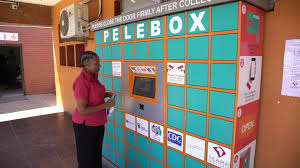
A renowned award was given to Neo Hutiri, a businessman from South Africa, for his inventive and original Pelebox solution.
In honour of his innovative invention, Hutiri was awarded a unique medal by the Royal Academy of Engineering to mark the tenth anniversary of the Africa Prize for Engineering Innovation.
CNN reported that King Charles III’s sister Princess Anne awarded him a medal and a £50,000 (R930, 000 000) prize from the UK’s Royal Academy of Engineering in February of this year.
Pelebox is an internet-based platform that manages various internet-connected smart lockers. Pelebox smart lockers allow patients to pick up their repeat chronic medication in less than two minutes, saving them hours of waiting in queues at public clinics.
Through the use of technology, this social innovation improves service delivery and offers truly patient-centered care. Malls, commuter nodes, and partner retail businesses are just a few locations where Pelebox smart lockers can be deployed.
They act as stand-in avenues for communication with patients, freeing up clinic resources to focus on interactions between patients and providers rather than dispensing. Pelebox smart lockers work well when a national health ministry wants to serve more people but is limited by the quantity of traditional healthcare institutions, staff shortages, and higher patient loads.
It is said that South Africa has the highest rate of antiretroviral therapy (ART) for HIV and AIDS patients worldwide, and the nation is home to a growing number of individuals with non-communicable diseases (NCDs) requiring long-term care. Public sector hospitals provide medical services to 84% of our population.
Long waiting times in clinics are caused by a combination of high patient traffic and staffing deficiencies.
A patient with a chronic condition typically receives a repeat prescription for a duration of six months.
Between 6-month clinical examinations, the patient merely needs to visit the hospital to pick up their prescription.
Approximately 70% of a facility’s daily prescription load is filled by filling repeat prescriptions. Patients typically have to wait for extended periods of time—more than three hours. Over 4.3 million man-hours are lost per month.
This exposes the patient to adherence barriers that may lead to inadequate health outcomes and financially drain them from missed work and commuting costs.
This is how it works:
A patient receives a prescription for a chronic medication for six months after enrolling in the local clinic’s collection program. Prepackaged medication is placed into the self-service Pelebox smart locker. A patient receives an OTP (one-time-pin) over SMS from the system, which they then use to retrieve their medication from the Pelebox smart locker. After providing their OTP and mobile number for verification, the patient would then be prompted to access a cubicle containing their medication.
Editor’s note: This Pelebox smart lockers will help millions of people who are on medication for their chronic conditions and can’t afford to spend hours at the clinic waiting to receive their repeats. Often, our healthcare system is constrained by a number of issues including staff shortages, and increased patient loads. This innovation will benefit both patients and the health care centres across the country and beyond.
Description: Innovator Neo Hutiri has been awarded a special medal from the Royal Academy of Engineering to commemorate ten years of the Africa Prize for Engineering Innovation in recognition of his creative idea, Pelebox, an online platform that controls different smart lockers with internet access.
Editor: Thato Mahlangu
Project manager: Do4SA
Do4SA NPC
Standard Bank
Branch: 024210
Acc. Number: 371 278 627
Swift Address: SBZA ZA JJ
Subscribe to The Altruist monthly newsletter which will help decision-makers gain a ground level understanding of the dynamics of poverty.